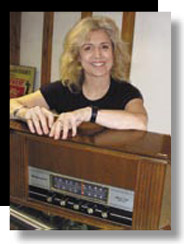 I’ve always loved radio.
I’ve always loved radio.
My grandparents’ gigantic Zenith wood cabinet the size of a small refrigerator, then my first transistor radio the size of an iPod, but thicker. It produced the thin sound of early Japanese imports, but I took it everywhere and hid it under my pillow when Mom checked to see if I was asleep. I patiently wound turns of copper wire to fabricate a crystal radio; the reception was limited and tuning was a chore, but I made my radio myself. I taped AM onto my father’s reel-to-reel and made-believe DJ’ed my own shows.
I came home from school to lunch: Helen Trent and The Lone Ranger, and just after supper, The Shadow: “What darkness lurks in the hearts of men…” The Soaps. My early days of music radio were filled with novelty songs: “Beep Beep,” “Itsy Bitsy Teenie Weenie Yellow Polka Dot Bikini,” “Alley Oop.” Now we hear novelty songs only at Christmas.
My older sister introduced me to Wolfman Jack, Scott Muni, Murray the K, Cousin Brucie, and Daa-aan In-grahm. I was as hooked on radio as breathing, and followed these giants as they moved from station to station, from AM to FM, to obscurity.
Why does radio play such an important role in music’s power? Because we associate events in our lives with what we were hearing at that moment. Each of our five senses triggers memory, and just as surely as the smell of baking pound cake snaps me back to my grandmother’s kitchen, so “Love is Strange” transports me to my basement darkroom, “We Gotta Get Outta This Place” to my unhappy days in girls’ school, and pretty much anything by Jimi Hendrix to….well, you get the idea.
I’m one of millions.
Radio allows us to hear music while experiencing life first-hand. When listening to a song, we might be stealing a first kiss, saying goodbye, or watching a sunset far from home. Regrettably, music videos replace our own experience with a stranger’s visuals. Instead of associating a song with our own unique event, we associate it with what the director envisioned. It’s a low-tech, two-dimensional virtual vacation: no power, no wracking personal connection, no smell, no touch. Here’s an example: for half a million people, Woodstock was mud between the toes, thirst, smelly bodies and sweet smoke, coughing and laughter and rain, sex, confusion, blasting speakers and a 360-degree panorama in 3-D living color for three days. For the rest of us, it’s a 2-D three hour movie with a great soundtrack. What do you see when Jimi plays the Star-Spangled Banner every July 4th?
Unfortunately, today’s radio mirrors the movement toward homogeneity in all aspects of this country’s cultures. We used to favor seafood in the Northeast and chili in the Southwest, but today we find bland shrimp tacos everywhere. The hub of local commerce, formerly Main Street, is now Generic Mall, selling the same books, CDs, donuts, sunglasses, and eight movies to every town in America. There may be more country stations in Dallas than Detroit, but the playlists are identical. No hometown heroes, no vibrant mix of genres, no innovation, no deep tracks, just all the hits, all the f’ing time.
The hard truth is that we ask for this. We all attend shows where we wait for familiar hits and disregard new material…which we eventually come to know and love. Why can’t we have faith that new cuts and deep tracks are going to grow on us, or at least give us an appreciation for the familiar? Are we so lazy that we won’t listen and learn for three or four minutes?
Just a suggestion: find an independent station in your area and listen to it at least half the time. Don’t zone out when something unfamiliar comes on, pay more attention. Someone at the station knows a lot about music and thinks this particular music is worth listening to. Maybe they’re right. E
—Suzanne Cadgène



Be the first to comment!